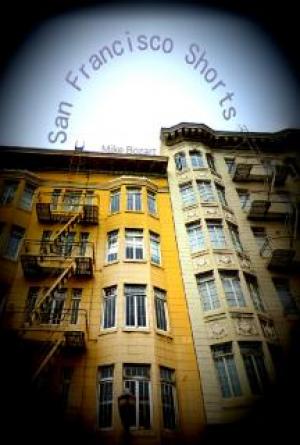JUDE.
GOPHER HILL had determined that it could not endure Jude any longer.
The inhabitants of Gopher Hill possessed an unusual amount of kindness and long-suffering, as was proved by the fact that Chinamen were allowed to work all abandoned claims at the Hill. Had further proof been necessary, it would have been afforded by the existence of a church directly beside the saloon, although the frequenters of the sacred edifice had often, during week-evening meetings, annoyed convivial souls in the saloon by requesting them to be less noisy.
But Jude was too much for Gopher Hill. No one molested him when he first appeared, but each citizen entered a mental protest within his own individual consciousness; for Jude had a bad reputation in most of the settlements along Spanish Creek.
It was not that he had killed his man, and stolen several horses and mules, and got himself into a state of most disorderly inebriation, for, in the opinion of many Gopher Hillites, these actions might have been the visible results of certain virtuous conditions of mind.
But Jude had, after killing a man, spent the victim’s money; he had stolen from men who had befriended him; he had jumped claims; he had denied his score at the storekeeper’s; he had lied on all possible occasions; and had gambled away money which had been confided to him in trust.
One mining camp after another had become too hot for him; but he never adopted a new set of principles when he staked a new claim, so his stay in new localities was never of sufficient length to establish the fact of legal residence. His name seemed to be a respectable cognomen of Scriptural extraction, but it was really a contraction of a name which, while equally Scriptural and far more famous, was decidedly unpopular—the name of Judas Iscariot.
The whole name had been originally bestowed upon Jude, in recognition of his success in swindling a mining partner; but, with an acuteness of perception worthy of emulation, the miners determined that the length of the appellation detracted from its force, so they shortened it to Jude.
As a few of the more enterprising citizens of Gopher Hill were one morning discussing the desirableness of getting rid of Jude, and wondering how best to effect such a result, they received important foreign aid.
A man rode up to the saloon, dismounted, and tacked on the wall a poster offering one thousand dollars reward for the apprehension of a certain person who had committed an atrocious murder a month before at Duck Run.
The names and aliases of the guilty person were unfamiliar to those who gathered about the poster, but the description of the murderer’s appearance was so suggestive, that Squire Bogern, one of the bystanders, found Jude, and requested him to read the poster.
“Well, ’twasn’t me done it,” sulkily growled the namesake of the apostolic treasurer.
“Ther’ hain’t nobody in Gopher that ’ud take a feller up fur a reward,” replied the squire, studiously oblivious of Jude’s denial; “but it’s a nice mornin’ fur a walk. Ye can’t miss the trail an’ git lost, ye know. An’, seein’ yer hevn’t staked any claim, an’ so hain’t got any to dispose of, mebbe yer could git, inside of five minutes.”
Jude was accustomed to “notices to quit,” and was able to extract their import from any verbiage whatever, so he drank by and to himself, and immediately sauntered out of town, with an air of bravado in his carriage, and a very lonesome look in his face.
Down the trail he tramped, past claims whose occupants knew him well enough, but who, just as he passed, found some excuse for looking the other way.
He passed through one camp after another, and discovered (for he stopped at each saloon) that the man on horseback had preceded him, and that there seemed a wonderful unanimity of opinion as to the identity of the man who was wanted.
Finally, after passing through several of the small camps, which were dotted along the trail, a mile or two apart, Jude flung himself on the ground under a clump of azaleas, with the air of a man whose temper had been somewhat ruffled.
“I wonder,” he remarked, after a discursive, fitful, but very spicy preface of ten minutes’ duration, “why they couldn’t find somethin’ I hed done, instead of tuckin’ some other feller’s job on me? I hev had difficulties, but this here one’s just one more than I knows on. Like ’nuff some galoot’ll be mean ’nuff to try to git that thousand. I’d try it myself, ef I wuz only somebody else. Wonder why I can’t be decent, like other fellers. ’Twon’t pay to waste time thinkin’ ’bout that, though, fur I’ll hev to make a livin’ somehow.”
Jude indulged in a long sigh, perhaps a penitential one, and drew from his pocket a well-filled flask, which he had purchased at the last saloon he had passed.
As he extracted it, there came also from his pocket a copy of the poster, which he had abstracted from a tree en route.
“Thar ’tis again!” he exclaimed, angrily. “Can’t be satisfied showin’ itself ev’rywhar, but must come out of my pocket without bein’ axed. Let’s see, p’r’aps it don’t mean me, after all—’One eye gone, broken nose, scar on right cheek, powder-marks on left, stumpy beard, sallow complexion, hangdog look.’ I’d give a thousand ef I had it to git the feller that writ that; an’ yit it means me, an’ no dodgin’. Lord, Lord! what ’ud the old woman say ef she wuz to see me nowadays?”
He looked intently at the flask for a moment or two, as if expecting an answer therefrom, then he extracted the cork, and took a generous drink. But even the liquor failed to help him to a more cheerful view of the situation, for he continued:
“Nobody knows me—nobody sez, ‘Hello!’—nobody axes me to name my bitters—nobody even cusses me. They let me stake a claim, but nobody offers to lend me a pick or a shovel, an’ nobody ever comes to the shanty to spend the evenin’, ’less it’s a greenhorn. Curse ’em all! I’ll make some of ’em bleed fur it. I’ll git their dust, an’ go back East; ther’s plenty of folks thar that’ll be glad to see me, ef I’ve got the dust. An’ mebbe ’twould comfort the old woman some, after all the trouble I’ve made her. Offer rewards fur me, do they? I’ll give ’em some reason to do it. I haint afeard of the hull State of Californy, an’——Good Lord! what’s that?”
The gentleman who was not afraid of the whole State of California sprang hastily to his feet, turned very pale, and felt for his revolver, for he heard rapid footsteps approaching by a little path in the bushes.
But though the footsteps seemed to come nearer, and very rapidly, he slowly took his hand from his pistol, and changed his scared look for a puzzled one.
“Cryin’! Reckon I ain’t in danger from anybody that’s bellerin’; but it’s the fust time I’ve heerd that kind of a noise in these parts. Must be a woman. Sounds like what I used to hear to home when I got on a tear; ’tis a woman!”

“GET HIM—GET JOHNNY!” CRIED THE WOMAN, FALLING ON HER
KNEES, AND SEIZING JUDE’S HAND.
As he concluded, there emerged from the path a woman, who was neither very young nor very pretty, but her face was full of pain, and her eyes full of tears, which signs of sorrow were augmented by a considerable scare, as she suddenly found herself face to face with the unhandsome Jude.
“Don’t be afeard of me, marm,” said Jude, as the woman retreated a step or two. “I’m durned sorry for yer, whatever’s the matter. I’ve got a wife to home, an’ it makes me so sorry to hear her cry, that I get blind drunk ez quick ez I ken.”
This tender statement seemed to reassure the woman, for she looked inquiringly at Jude, and asked:
“Have ye seen a man and woman go ’long with a young one?”
“Nary,” replied Jude. “Young one lost?”
“Yes!” exclaimed the woman, commencing to cry again; “an’ a husban’, too. I don’t care much for him, for he’s a brute, but Johnny—blessed little Johnny—oh, oh!”
And the poor woman sobbed pitifully.
Jude looked uneasy, and remembering his antidote for domestic tears, extracted the bottle again. He slowly put it back untasted, however, and exclaimed:
“What does he look like, marm?—the husband I mean. I never wanted an excuse to put a hole through a feller ez bad ez I do this mornin’!”
“Don’t—don’t hurt him, for God’s sake!” cried the woman. “He ain’t a good husband—he’s run off with another woman, but—but he’s Johnny’s father. Yet, if you could get Johnny back—he’s the only comfort I ever had in the world, the dear little fellow—oh, dear me!”
And again she sobbed as if her heart was broken.
“Tell us ’bout ’em. Whar hev they gone to? what do they luk like? Mebbe I ken git him fur yer,” said Jude, looking as if inclined to beat a retreat, or do anything to get away from the sound of the woman’s crying.
“Get him—get Johnny?” cried the woman, falling on her knees, and seizing Jude’s hand. “I can’t give you anything for doin’ it, but I’ll pray for you, as long as I’ve got breath, that God may reward you!”
“I reckon,” said Jude, as he awkwardly disengaged his hand, “that prayin’ is what’ll do me more good than anythin’ else jest now. Big feller is yer husband? An’ got any idee whar he is?”
“He is a big man,” replied the woman, “and he goes by the name of Marksey in these parts; and you’ll find him at the Widow Beckel’s, across the creek. Kill her if you like—I hope somebody will. But Johnny—Johnny has got the loveliest brown eyes, and the sweetest mouth that was ever made, and——”
“Reckon I’ll judge fur myself,” interrupted Jude, starting off toward the creek, and followed by the woman. “I know whar Wider Beckel’s is, an’—an’ I’ve done enough stealin’, I guess, to be able to grab a little boy without gittin’ ketched. Spanish Crick’s purty deep along here, an’ the current runs heavy, but——”
The remainder of Jude’s sentence was left unspoken, for just then he stepped into the creek, and the chill of the snow-fed stream caused him to hold his breath.
“Remember you ain’t to hurt him!” screamed the woman; “nor her, neither—God forgive me. But bring Johnny—bring Johnny, and God be with you.”
The woman stood with clasped hands watching Jude until he reached the opposite bank, shook himself, and disappeared, and then she leaned against a tree and trembled and cried until she was startled by hearing some one say:
“Beg pardon, madame, but have you seen any one pass?”
The woman raised her head, and saw a respectable, severe looking man, in clothing rather neater than was common along Spanish Creek.
“Only one,” she replied, “and he’s the best man livin’. He’s gone to get Johnny—he won’t be gone long.”
“Your husband, ma’am?”
“Oh, no, sir; I never saw him before.”
“One eye gone; broken nose; scar on right cheek; powder-marks on left——”
“Yes, sir, that’s the man,” said the wondering woman.
“Perhaps you may not have seen this?” said the man handing her one of the posters describing Jude.
Then he uttered a shrill whistle.
The woman read the paper through, and cried:
“It’s somebody else—it must be—no murderer would be so kind to a poor, friendless woman. Oh, God, have I betrayed him? Don’t take him, sir—it must be somebody else. I wish I had money—I would pay you more than the reward, just to go away and let him alone.”
“Madame,” replied the man, beckoning to two men who were approaching, “I could not accept it; nor will I accept the reward. It is the price of blood. But I am a minister of the gospel, ma’am, and in this godless generation it is my duty to see that the outraged dignity of the law is vindicated. My associates, I regret to say, are actuated by different motives.”
“You just bet high on that!” exclaimed one of the two men who had approached, a low-browed, bestial ruffian. “Half a thousan’ ’s more’n I could pan out in a fortnight, no matter how good luck I had. Parson he is a fool, but we hain’t no right to grumble ’bout it, seein’ we git his share—hey, Parleyvoo?”
“You speak truly, Mike,” replied his companion, a rather handsome looking Frenchman, of middle age. “And yet Jean Glorieaux likes not the labor. Were it not that he had lost his last ounce at monte, and had the fever for play still in his blood, not one sou would he earn in such ungentle a manner.”
“God’s worst curses on all of you!” cried the woman, with an energy which inspired her plain face and form with a terrible dignity and power, “if you lay a hand on a man who is the only friend a poor woman has ever found in the world!”
Glorieaux shuddered, and Mike receded a step or two; but the ex-minister maintained the most perfect composure, and exclaimed:
“Poor fools! It is written, ‘The curse, causeless, shall not fall.’ And yet, madame, I assure you that I most tenderly sympathize with you in your misfortunes, whatever they may be.”
“Then let him alone!” cried the woman. “My only child has been stolen away from me—dear little Johnny—and the man offered to go get him. And you’ve made me betray him. Oh, God curse you all!”
“Madame,” replied the still imperturbable parson, “the crime of blood-guiltiness cannot be imputed to you, for you did not know what you were doing.”
The woman leaned against a tree, and waited until Glorieaux declared to the parson he would abandon the chase.
“It is useless,” said he, striking a dramatic attitude, and pointing to the woman, “for her tears have quenched the fiery fever in the blood of Glorieaux.”
“Then I’ll git the hull thousand,” growled Mike, “an’ I’ll need it, too, if I’ve got to stand this sort of thing much longer.”
A confused sound of voices on the other side of the creek attracted the attention of the men, and caused the woman to raise her head. A moment later Jude appeared, with a child in his arms, and plunged into the water.
“Now we’ll have him!” cried the parson; “and you, madame, will have your child. Be ready to chase him, men, if he attempts to run when he gets ashore.”
“Go back! go back!” screamed the woman. “They are after you, these men. Try to——”
The law-abiding parson placed his hand over the woman’s mouth, but found himself promptly flying backward through space, while Mike roared:
“Touch a woman, will yer? No thousand dollars nor any other money, ’ll hire me to travel with such a scoundrel. Catch him yerself, if yer want ter.”
“But if you do,” said Glorieaux, politely, as he drew his revolver, “it will be necessary for Glorieaux to slay the Lord’s anointed.”
“Follered, by thunder!” said Mike.
It was true. During the few seconds which had been consumed in conversation, Jude got well into the creek. He had not seemed to hear the woman’s warning; but now a greater danger threatened him, for on the opposite bank of the creek there appeared a man, who commenced firing at Jude’s head and the small portion of his shoulders that was visible.
“The monster. Oh, the wretch!” screamed the woman. “He may hit Johnny, his only son! Oh, God have mercy on me, and save my child!”
A shot immediately behind her followed the woman’s prayer, and Glorieaux exclaimed, pointing to the opposite bank, where Marksey was staggering and falling:
“Glorieaux gathered from your words that a divorce would be acceptable, madame. Behold, you have it!”
“Pity nobody didn’t think of it sooner,” observed Mike, shading his eyes as he stared intently at Jude, “for there’s a red streak in the water right behind him.”
The woman was already standing at the water’s edge, with hands clasped in an agony of terror and anxiety. The three men hastened to join her.
“Wish I could swim,” said Mike, “for he’s gettin’ weak, an’ needs help.”
The parson sprang into the water, and, in spite of the chill and the swift current, he was soon by Jude’s side.
“Take the young un,” gasped Jude, “for I’m a goner.”
“Put your hand on my shoulder,” said the parson. “I can get you both ashore.”
“Tain’t no use,” said Jude, feebly; “corpses don’t count for much in Californy.”
“But your immortal part,” remonstrated the parson, trying to seize Jude by the hand which held little Johnny.
“God hev mercy on it!” whispered the dying man; “it’s the fust time He ever had an excuse to do it.”
Strong man and expert swimmer as the ex-minister was, he was compelled to relinquish his hold of the wounded man; and Jude, after one or two fitful struggles against his fate, drifted lifeless down the stream and into eternity, while the widowed mother regained her child. The man of God, the chivalrous Frenchman and the brutish Mike slowly returned to their camp; but no one who met them could imagine, from their looks, that they were either of them anything better than fugitives from justice.










